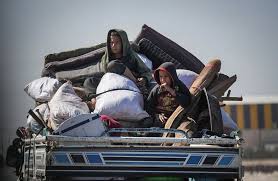In a landmark shift marking the end of decades of strained and hierarchical relations, Lebanon and Syria have embarked on a new phase of cooperation defined by mutual respect, pragmatic diplomacy, and shared humanitarian priorities. The development comes amid broader regional changes following the Syrian revolution and evolving dynamics across the Levant.
Lebanon Signals Readiness to Coordinate Refugee Return with Damascus
Lebanon’s ministerial committee on Syrian refugees announced the government’s readiness to develop a comprehensive plan—jointly with Syrian authorities and international organisations—for the safe, voluntary, and dignified return of Syrian refugees to their country.
During its second meeting on Wednesday, chaired by Deputy Prime Minister and attended by Ministers Michel Mansi, Ahmad Hajar, Haneen Al-Sayyed, Adel Nassar, and Mohammad Haidar, the committee reviewed efforts to compile accurate data on the refugee population and assess their legal, social, and economic status. Minister Youssef Raji was absent due to travel abroad.
In its concluding statement, the committee reaffirmed Lebanon’s firm opposition to permanent resettlement and underscored the importance of coordinated repatriation efforts rooted in actionable, realistic mechanisms.
Sharaa and Salam: Turning the Page on Subordination
Syrian President Ahmad al-Sharaa and Lebanese Prime Minister Nawaf Salam formally declared an end to the legacy of subordination and interference that once defined Syrian-Lebanese relations under the previous regime. Their meeting signalled a pivot toward a balanced, respectful partnership built on sovereignty, non-interference, and mutual understanding.
This diplomatic milestone took place during Salam’s official visit to Damascus—his first since assuming office—which included a ministerial delegation comprising Foreign Minister Youssef Raji, Defence Minister Michel Mansi, and Interior Minister Ahmad Hajar.
Bilateral Talks: Borders, Security, and Shared Concerns
In meetings with President Sharaa and Syrian Foreign Minister Assaad al-Shibani, the Lebanese delegation discussed critical issues including border demarcation, anti-smuggling coordination, and the management of land and maritime frontiers. These matters had also featured prominently in recent Saudi-sponsored talks between the defence ministers of both nations in Jeddah.
Prime Minister Salam described the visit as “an opportunity to open a new chapter rooted in trust, neighbourliness, and sovereignty.” He added: “Syria’s decisions belong to Syrians, and Lebanon’s to the Lebanese.” His remarks were welcomed by the Syrian leadership.
Refugees and Missing Persons: Humanitarian Priorities
Both parties reaffirmed their commitment to ensuring the safe return of Syrian refugees from Lebanon, with support from the United Nations and friendly states. The Lebanese side also raised the sensitive issue of Lebanese detainees and missing persons in Syria, urging full disclosure of their fates and judicial cooperation on unresolved security cases—including the 2013 bombings of the Al-Taqwa and Al-Salam mosques.
Enhanced Security and Economic Integration
The joint statement highlighted the importance of deepening security cooperation to ensure border stability and prevent renewed unrest. Economic discussions included the reopening of land and maritime trade routes, oil and gas imports, reactivation of air travel, and the revival of past bilateral agreements—especially those linked to the Lebanese-Syrian Higher Council.
Both sides expressed a desire to modernise infrastructure and streamline cross-border trade, with emphasis on sectors such as energy, logistics, and agriculture.
Establishing Joint Oversight Mechanisms
The two governments agreed to form a joint ministerial committee involving the ministries of foreign affairs, defence, interior, and justice to oversee security and legal files. Additional committees will be tasked with managing economic development and public services, coordinated by the ministries of economy, transport, social affairs, and energy.
Call for Sanctions Relief and Regional Cooperation
At the conclusion of the visit, both parties jointly called for the lifting of international sanctions on Syria, arguing that economic revitalisation and reconstruction would not only benefit Syria but also enhance Lebanon’s access to regional markets—especially in energy and exports.
This visit marks a pivotal moment in Syrian-Lebanese relations, underscoring a shared determination to overcome the burdens of the past and shape a future built on partnership rather than patronage. It signals a regional recalibration—one that invites sustained dialogue, cooperation, and a renewed commitment to stability and prosperity for both nations.
This article was translated and edited by The Syrian Observer. The Syrian Observer has not verified the content of this story. Responsibility for the information and views set out in this article lies entirely with the author.


